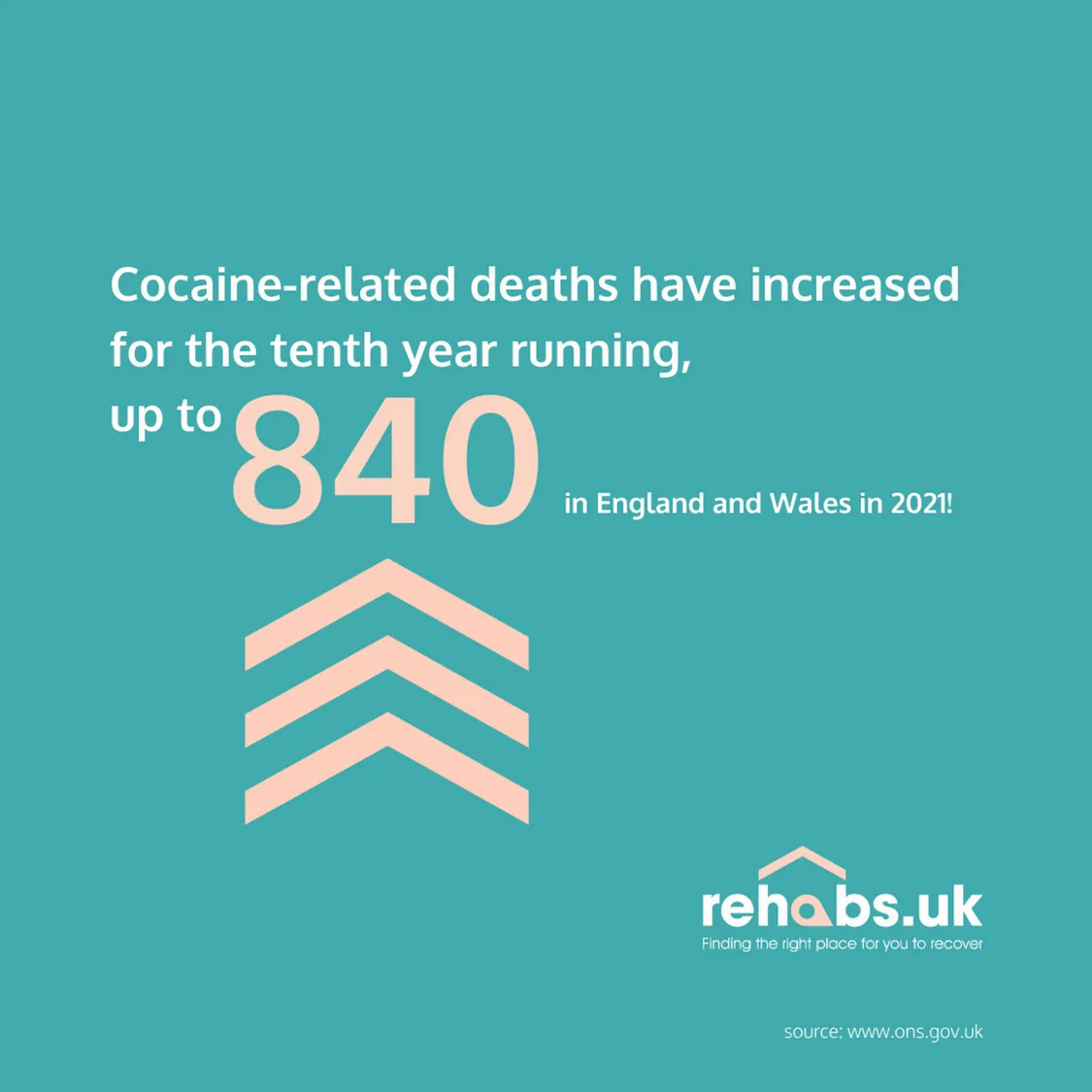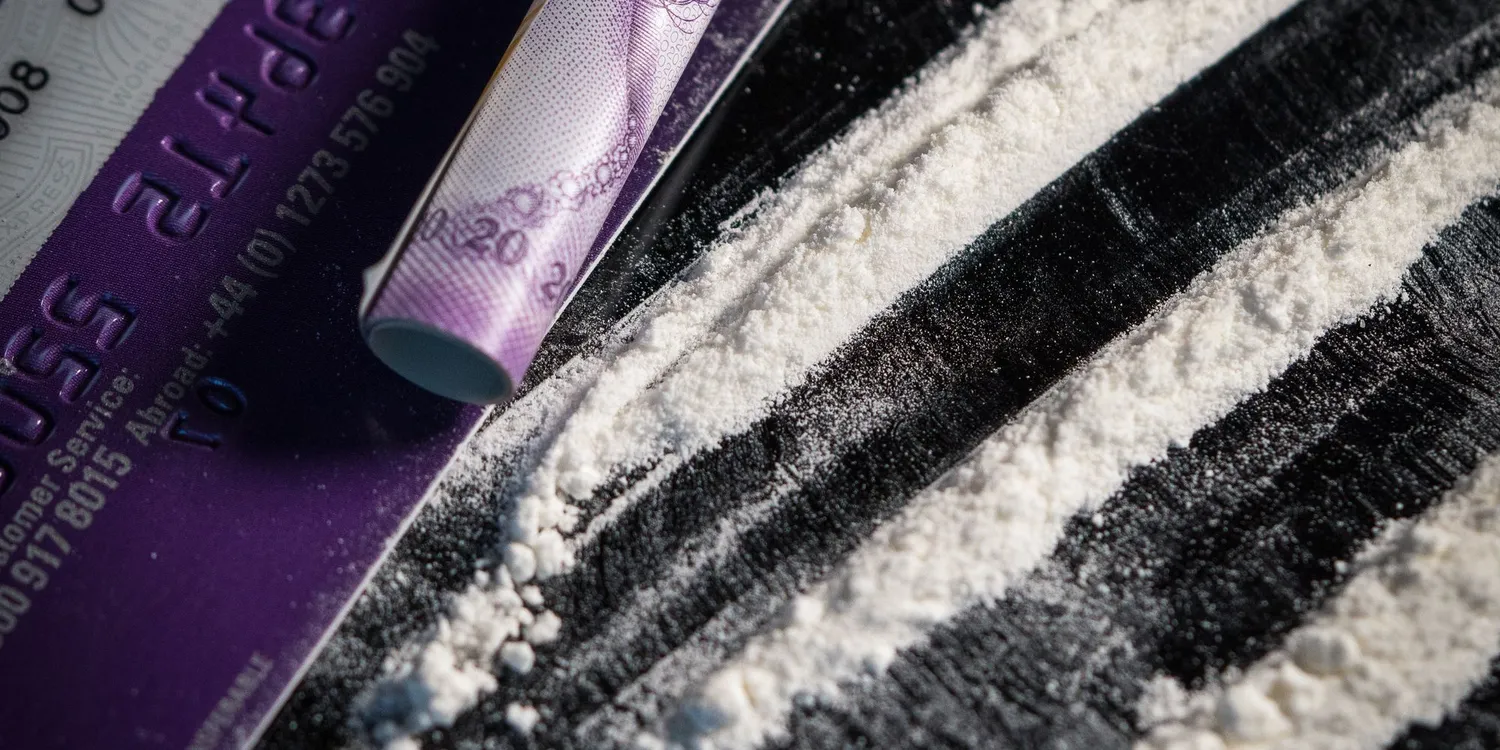19 Nov 2025
Rehabs UK finds unsettling rise in cocaine addiction
In recent years Rehabs UK has found an increasingly common trend. Cocaine use is continuing to rise. The number of individuals contacting the service worried about their cocaine use and its effects has risen significantly in the past couple of years.
Out of all drug related enquiries we receive, cocaine use in the UK accounts for almost 75%. The typical age range is between 25-35, 75% men and 25% women.
Rehabs UK realise that these figures are from people reaching out and that the numbers of people addicted to cocaine in the UK is much higher.
According to government figures, of the people starting treatment in between 2020 to 2021, 61% of people starting treatment self-referred (which could have been following advice from a healthcare professional) or were referred by family and friends.
In a lot of these cases there is a clear link between alcohol and cocaine. Many individuals who require our services for cocaine also have an alcohol problem or link their cocaine use with alcohol use. The two often go hand-in-hand.
When mixing alcohol and cocaine the two substances create a unique substance known as cocaethylene as result of the substances being metabolised in the liver. The combination can have dangerous effects.
If you want to learn about out the specifics of cocaine, you can find more information on our page cocaine addiction
How bad is cocaine use in the UK?
Data from the Office for National Statistics shows that since 2012/13 there has been a rising trend in drug use amongst adults.
The number of adults starting treatment for powder cocaine problems increased by 2 percentage points, reaching a high of 19% of new entrants in the year ending March 2024. The number of people entering treatment for powder cocaine increased by 10% in 2022-2023, surpassing a previous peak in 2019-2020.
Deaths involving cocaine have risen for 13 consecutive years, with 1,279 deaths registered in 2024. This is a 14.4% increase from 2023 and eleven times higher than the number in 2011.
9.4% of adults aged 16 to 59 reported using a drug in 2019/20. And for those aged 16 to 24, prevalence was even higher at 21%.
Even more concerning is that drug use in those aged 11 to 15 in England has also been increasing since 2014, reversing a previously declining trend in drug use amongst this age group.
Production, seizures, and use of cocaine all hit new highs in 2023, making cocaine the world’s fastest-growing illicit drug market. Illegal production skyrocketed to 3,708 tons, nearly 34 per cent more than in 2022. Global cocaine seizures reached a record high at 2,275– a 68 per cent rise over 2019-2023. Use of cocaine, meanwhile, has grown from 17 million users in 2013 to 25 million users in 2023.
You can explore our page more on how to detox safely from cocaine to learn including how long it takes and, what the withdrawal symptoms are. Whether detoxing from cocaine at home or in a residential rehab its important to look at all the risks.

UK cocaine use statistics
While powder cocaine use in the last year has remained relatively stable in recent years according to the Crime Survey for England and Wales, wastewater analysis for 2023-2024 suggests that overall consumption is estimated to have increased by 7%.
UK cocaine use statistics show that in 2017-2018, 2.6% of people aged 16-59 took powdered cocaine (as opposed to crack cocaine, the more potent variant of the drug, which was taken by 0.1% of the population in the same period), up from 2.4% in 2013-2014, according to Home Office figures.
Data from the crime survey of England and Wales showed that powdered cocaine use increased from 2.2% in 2014/15 to 3.4% in 2017/18 in households earning £50,000 a year or more.
(Use among those earning less than £10,000 a year fell during this period, although researchers believe the use of crack cocaine may be on the rise in poorer communities.) But powdered cocaine now appeals to those in more modest income brackets, too.
Cocaine-related deaths have increased for the sixth year running, up to 432 deaths in England and Wales in 2017, compared with 112 in 2011.
It’s worth noting that these figures refer to powdered and crack cocaine, as official statistics do not differentiate between the two when establishing cause of death. Many of these deaths will involve users who have long standing addictions to crack cocaine, as well as other co-dependencies.
Reasons behind the spike in cocaine use

More accessible
Cocaine has never been more accessible in the UK.
In previous years the drug was typically used by the rich and famous. The drug was common in London’s financial sector. It was seen as a way to distinguish class and wealth but due to the fact more local dealers are offering the drug and the cost of Cocaine is decreasing this barrier is no longer.
According to a report in The Guardian, Ian Hamilton, a senior lecturer in mental health at the University of York said: “It’s not for financiers in the City of London any more. It’s more affordable, so that’s opened up the market to people who wouldn’t have tried it before.”
And dealers are savvy marketers. He goes on to say he can get a “bargain bucket offer” or five grams of cocaine for £210.
There is less of a stereotype for cocaine these days. As other drugs might be viewed as ‘dirty’ or frowned upon, cocaine by comparison is often viewed by a surprising number of people as ‘not even a drug’.
In fact, it is now so normalised that many people know individuals, friends and colleagues who have used or use cocaine. Society's view of cocaine is significantly different to other illegal drugs and this shift of perception over the years has led to increased accessibility acceptance.
Working long hours
The UK works the most hours in Europe according to a report by The Guardian.
The stretch of hours individuals are working can result in the use of cocaine. This is due to the nature of the drug.
Cocaine gives you bursts of energy and keeps you awake for long periods of time. As a result, some workers may feel tempted to use the drug to continue their work productively.
Welfare and NHS mental health cuts
With more people than ever struggling with their mental health in the UK it is not surprising that people are looking for an alternative solution.
As cuts to NHS services continue and long-waiting lists for mental health services continue, some individuals have started to use coke to help cope with their issues. Some argue that by doing cocaine they are able to mask these inner feelings for a few hours. They disappear and don’t feel as bad.
However, when they start to come off the drug these negative feelings can intensify. Which in turn, can create a vicious cycle of continued use.
Change in nightlife
The nightlife scene in the UK has been decreasing over the years. With many clubs and pubs closing their doors. After Covid-19 the scene has continued to struggle.
As a direct result of this, the increase in alcohol prices in clubs and pubs has put many people off from venturing out. Many people are now choosing to pick up some alcohol at their local shop and then pick up a bag of Cocaine.
According to an individual interviewed by The Guardian, unlike the club drug ecstasy, for many users cocaine is taken at home
He would often avoid bars to head back to someone’s flat, turn on some music and get a bag of cocaine in. “Bars are full of dickheads, so I’d say: ‘Let’s get out of here – I’m done.’ Only I wouldn’t be done: I’d stupidly stay up until 7am, having the same conversation.”
Side effects and health risks of using cocaine
| Cocaine is highly addictive |
|---|
Looking for support for you or a loved one?

If you are looking for cocaine rehabilitation for you or a loved one, we have plenty of useful information about cocaine rehab and outpatient programmes, including what happens in rehab and how to detox safely.
Here at Rehabs UK we understand that taking the first step into recovery can be difficult. There are so many different options and treatments available it can often be overwhelming.
With Rehabs UK at your side, it doesn’t need to be, our fully-trained Treatment Advisors are here to help you and talk you through all available options finding the one best suited to each individual's requirement. We also provide a comprehensive aftercare plan as standard.
For your free assessment or just a chat to find out more, contact our Treatment Advisors today!
